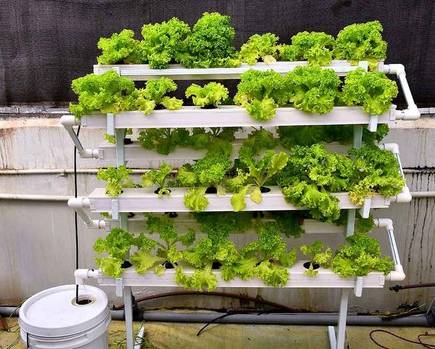Unlike farmers who work on the soil and are closer to nature, people living in apartments crave a home garden to grow vegetables and flowering plants. In a city’s concrete jungle, space is scarce and having a villa with an attached garden is even rarer. There is an increasing trend to buy a naturally grown produce that is produced organically without the use of pesticides. UrbanKisaan (Kisaan means “farmer” in Hindi), a start-up in Hyderabad, is revolutionising the concept of urban gardens using hydroponic farming methods. Hydroponics is a technique of cultivation where plants are grown without soil, wherein the roots of the plants are directly exposed to water, which is a mixture of minerals and nutrients. This technique helps in growing plants and vegetables in urban areas or barren lands. It claims to use 95% less water than conventional methods of farming.
It offers vertical gardens that can be grown on balconies or rooftops. UrbanKisaan manages everything from the seeds to its proprietary farm-controlling software that allows people to grow their own healthy, fresh, and high-quality vegetables in their backyard. It offers 25 varieties of plants such as vegetables and berries, greens, herbs, cauliflower, bell peppers, and so on. It sells home-kits that cost anywhere between ₹ 15000 ($200) and ₹ 50000 ($650) depending upon the size of the vertical hydroponic garden[i]. UrbanKisaan has emerged among the top 100 social entrepreneurs in India as per Action For India (AFI) forum and is one of the top eight start-ups featured by Discovery India for its documentary series Planet Healers in 2019.

But who would buy a terrace garden that costs more than $200 and why? The impact of having a hydroponic garden that contributes to a world free of pesticides promotes sustainable practices, optimises urban space usage, increases oxygen supply at home, helps produce and grow fresh vegetables for self, and helps the family appeal to potential customers. Customer value can be discovered by studying the scope of the impact on the family, local communities, and the environment at large. For each of these scope elements, the marketer can discover value by asking questions such as the following: Who specifically is benefitting? How do you know they are benefitting? Who else can benefit? What are they benefitting from? What else can benefit? What are the contexts (where and when) under which the benefits are maximum? Why are the users benefitting?
[i] Prabalika M. Borah (2019). Farm refreshed: UrbanKisaan [Online]. Available from: https://www.thehindu.com/life-and-style/food/urban-kisaan-urbankisaan-hydroponic-vertical-hydroponic-hydroponic-for-home-vihari-kanukollu-dr-sairam-srinivas-chaganti-planet-healers-discovery-channel/article26578773.ece [1 Oct 2020]





